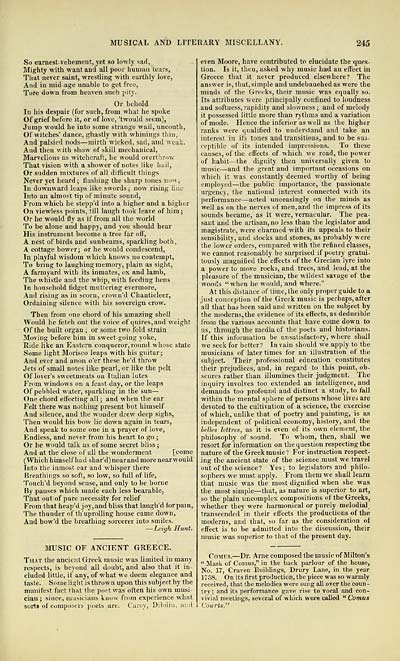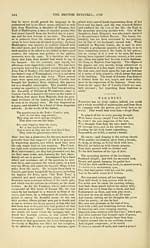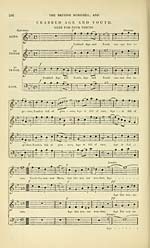Glen Collection of printed music > Printed music > British minstrel, and musical and literary miscellany
(253) Page 245
Download files
Complete book:
Individual page:
Thumbnail gallery: Grid view | List view

MUSICAL AND LITERARY MISCELLANY.
245
So earnest-vehement, yet so lo%vly sad,
Mighty with want and all poor human tears,
That never saint, wrestling with earthly love,
And in mid-age unable to get frue,
Tore down from heaven sucli pity.
Or behold
In his despair (for such, from what he spoke
Of grief before it, or of love, 'twould seem).
Jump would he into some strange wail, uncouth.
Of witches' dance, ghastly with whinings tliin.
And palsied nods — mirth wicked, sad, and weak.
And then with show of skill mechanical,
Marvellous as witchcraft, he would overtlirow
That vision with a shower of notes like hail,
Or sudden mixtures of all difficult things
Never yet heard ; flashing the sharp tones no^y,
In downward leaps like swords ; now rising tine
Into an almost tip of minute sound,
P'rom which he stepp'd into a higher and a higher
On viewless points, till laugh took leave of him;
Or he would fly as if from all the world
To be alone and happy, and you should hear
His instrument become a tree far otf,
A nest of birds and sunbeams, sparkling both,
A cottage bower; or he would condescend,
In playful wisdom which knows no contempt,
To bring to laughing memory, plain as siglit,
A farmyard with its inmates, ox and lamb.
The whistle and the whip, with feeding hens
In household fidget muttering evermore.
And rising as in scorn, crown'd Chanticleer,
Ordaining silence with his sovereign crow.
Then from one chord of his amazing shell
Would he fetch out the voice of quires, and weight
Of the built organ ; or some two fold strain
Moving before him in sweet-going yoke,
Ride like an Eastern conqueror, round whose state
Some light Morisco leaps with his guitar;
And ever and anon o'er these he'd throw
Jets of small notes like pearl, or like the pelt
Of lover's sweeimeats on Italian lutes
From windows on a feast-day, or the leaps
Of pebbled water, sparkling in the sun —
One chord efi'ecting all ; and when the ear
Felt there was nothing present but himself
And silence, and the wonder drew deep sighs,
Then would his bow lie down again in tears,
.4nd speak to some one in a prayer of love,
Endless, and never from his heart to go ;
Or he would talk as of some secret bliss ;
And at the close of all the wonderment [come
( Which himself hud shar'd) near and more near would
Into the inmost ear and whisper there
Breathings so soft, so low, so full of life,
Touch'd beyond sense, and only to be borne
By pauses which made each less bearable.
That out of pure necessity for relief
From that heap'd joy, and bliss that laugh'd for pain,
The thunder of th'uprolling house came down.
And bow'd the breathing sorcerer into smiles.
— Leiyh Hunt.
MUSIC OF ANCIENT GREECE.
That the ancient Greek music was limited in many
respects, is beyond all doubt, and also that it in-
cluded little, if any, of what we deem elegance and
taste. Some light is thrown upon this subject by the
manifest fact that the poet was often his own musi-
cian ; since, musicians know from experience what
sort* of composers poets are. Carey, Dilidiu, ai.il
even Moore, have contributed to elucidate the ques-
tion. Is it, then, asked why music had an effect in
Greece that it never produced elsewhere? The
answer is, that, simple and undebauchedas were the
minds of the Greeks, their music was equally so.
Its attributes were principally confined to loudness
and softness, rapidity and slowness ; and of melody
it possessed little more than rythms and a variation
of mode. Hence the inferior as well as the higher
ranks were qualified to understand and take an
interest in its tones and transitions, and to be sus-
ceptible of its intended impressions. To these
causes, of the efl'ects of which we read, the power
of habit — the dignity then universally given to
music — and the great and important occasions on
which it was constantly deemed worthy of being
employed— the public importance, the passionate
urgency, the national interest connected with its
performance — acted unceasingly on the minds as
well as on the nerves of men,and the impress of its
sounds became, as it were, vernacular. The pea-
sant and the artisan, no less than the legislator and
magistrate, were charmed with its appeals to their
sensibility, and stocks and stones, as probably were
the lower orders, compared with the refined classes,
we cannot reasonably be surprised if poetry gratui-
tously magnified the efl'ects of the Grecian lyre into
a power to move rocks, and trees, and lead, at the
pleasure of the musician, the wildest savage of the
woods "when he would, and where."
At this distance of time, the only proper guide to a
just conception of the Greek music is perhaps, after
all that has been said and written on the subject by
the moderns, the evidence of its effects, as deducible
from the various accounts that have come down to
us, through the media of the poets and historians.
If this information be unsatisfactory, where shall
we seek for better? In vain should we apply to the
musicians of later times for an illustration of the
subject. Their professional education constitutes
their prejudices, and, in regard to this point,_ob-
scures rather than illumines their judgment. The
inquiry involves too extended an intelligence, and
demands too profound and distinct a study, to fall
within the mental sphere of persons whose lives are
devoted to the cultivation of a science, the exercise
of which, unlike that of poeti-y and painting, is as
independent of political economy, history, and the
belles httres, as it is even of its own element, the
philosophy of sound. To whom, then, shall we
resort for information on the question respecting the
nature of the Greek music? For instruction respect-
ing the ancient state of the science must we travel
out of the science? Yes; to legislators and philo-
sophers we must apply. From them we shall learn
that music was the most dignified when she was
the most simple — that, as nature is superior to art,
so the plain uncomplex compositions of the Greeks,
whether they were harmonica! or purely melodial_
transcended in their efl'ects the productions of the
moderns, and that, so far as the consideration of
eff'ect is to be admitted into the discussion, their
music was superior to that of the present day.
CoMfs. — Dr. Ame composed the music of Milton's
" Mask of Comus," in the back parlour of the house.
No. 17, Craven Buildings, Drury Lane, in the year
1738. On its first production, the piece was so warmly
received, that the melodies were sung all over the coun-
try ; and its performance gave rise to vocal and con-
vivial meetings, several of whicli were called " Comus
Courti\^'
245
So earnest-vehement, yet so lo%vly sad,
Mighty with want and all poor human tears,
That never saint, wrestling with earthly love,
And in mid-age unable to get frue,
Tore down from heaven sucli pity.
Or behold
In his despair (for such, from what he spoke
Of grief before it, or of love, 'twould seem).
Jump would he into some strange wail, uncouth.
Of witches' dance, ghastly with whinings tliin.
And palsied nods — mirth wicked, sad, and weak.
And then with show of skill mechanical,
Marvellous as witchcraft, he would overtlirow
That vision with a shower of notes like hail,
Or sudden mixtures of all difficult things
Never yet heard ; flashing the sharp tones no^y,
In downward leaps like swords ; now rising tine
Into an almost tip of minute sound,
P'rom which he stepp'd into a higher and a higher
On viewless points, till laugh took leave of him;
Or he would fly as if from all the world
To be alone and happy, and you should hear
His instrument become a tree far otf,
A nest of birds and sunbeams, sparkling both,
A cottage bower; or he would condescend,
In playful wisdom which knows no contempt,
To bring to laughing memory, plain as siglit,
A farmyard with its inmates, ox and lamb.
The whistle and the whip, with feeding hens
In household fidget muttering evermore.
And rising as in scorn, crown'd Chanticleer,
Ordaining silence with his sovereign crow.
Then from one chord of his amazing shell
Would he fetch out the voice of quires, and weight
Of the built organ ; or some two fold strain
Moving before him in sweet-going yoke,
Ride like an Eastern conqueror, round whose state
Some light Morisco leaps with his guitar;
And ever and anon o'er these he'd throw
Jets of small notes like pearl, or like the pelt
Of lover's sweeimeats on Italian lutes
From windows on a feast-day, or the leaps
Of pebbled water, sparkling in the sun —
One chord efi'ecting all ; and when the ear
Felt there was nothing present but himself
And silence, and the wonder drew deep sighs,
Then would his bow lie down again in tears,
.4nd speak to some one in a prayer of love,
Endless, and never from his heart to go ;
Or he would talk as of some secret bliss ;
And at the close of all the wonderment [come
( Which himself hud shar'd) near and more near would
Into the inmost ear and whisper there
Breathings so soft, so low, so full of life,
Touch'd beyond sense, and only to be borne
By pauses which made each less bearable.
That out of pure necessity for relief
From that heap'd joy, and bliss that laugh'd for pain,
The thunder of th'uprolling house came down.
And bow'd the breathing sorcerer into smiles.
— Leiyh Hunt.
MUSIC OF ANCIENT GREECE.
That the ancient Greek music was limited in many
respects, is beyond all doubt, and also that it in-
cluded little, if any, of what we deem elegance and
taste. Some light is thrown upon this subject by the
manifest fact that the poet was often his own musi-
cian ; since, musicians know from experience what
sort* of composers poets are. Carey, Dilidiu, ai.il
even Moore, have contributed to elucidate the ques-
tion. Is it, then, asked why music had an effect in
Greece that it never produced elsewhere? The
answer is, that, simple and undebauchedas were the
minds of the Greeks, their music was equally so.
Its attributes were principally confined to loudness
and softness, rapidity and slowness ; and of melody
it possessed little more than rythms and a variation
of mode. Hence the inferior as well as the higher
ranks were qualified to understand and take an
interest in its tones and transitions, and to be sus-
ceptible of its intended impressions. To these
causes, of the efl'ects of which we read, the power
of habit — the dignity then universally given to
music — and the great and important occasions on
which it was constantly deemed worthy of being
employed— the public importance, the passionate
urgency, the national interest connected with its
performance — acted unceasingly on the minds as
well as on the nerves of men,and the impress of its
sounds became, as it were, vernacular. The pea-
sant and the artisan, no less than the legislator and
magistrate, were charmed with its appeals to their
sensibility, and stocks and stones, as probably were
the lower orders, compared with the refined classes,
we cannot reasonably be surprised if poetry gratui-
tously magnified the efl'ects of the Grecian lyre into
a power to move rocks, and trees, and lead, at the
pleasure of the musician, the wildest savage of the
woods "when he would, and where."
At this distance of time, the only proper guide to a
just conception of the Greek music is perhaps, after
all that has been said and written on the subject by
the moderns, the evidence of its effects, as deducible
from the various accounts that have come down to
us, through the media of the poets and historians.
If this information be unsatisfactory, where shall
we seek for better? In vain should we apply to the
musicians of later times for an illustration of the
subject. Their professional education constitutes
their prejudices, and, in regard to this point,_ob-
scures rather than illumines their judgment. The
inquiry involves too extended an intelligence, and
demands too profound and distinct a study, to fall
within the mental sphere of persons whose lives are
devoted to the cultivation of a science, the exercise
of which, unlike that of poeti-y and painting, is as
independent of political economy, history, and the
belles httres, as it is even of its own element, the
philosophy of sound. To whom, then, shall we
resort for information on the question respecting the
nature of the Greek music? For instruction respect-
ing the ancient state of the science must we travel
out of the science? Yes; to legislators and philo-
sophers we must apply. From them we shall learn
that music was the most dignified when she was
the most simple — that, as nature is superior to art,
so the plain uncomplex compositions of the Greeks,
whether they were harmonica! or purely melodial_
transcended in their efl'ects the productions of the
moderns, and that, so far as the consideration of
eff'ect is to be admitted into the discussion, their
music was superior to that of the present day.
CoMfs. — Dr. Ame composed the music of Milton's
" Mask of Comus," in the back parlour of the house.
No. 17, Craven Buildings, Drury Lane, in the year
1738. On its first production, the piece was so warmly
received, that the melodies were sung all over the coun-
try ; and its performance gave rise to vocal and con-
vivial meetings, several of whicli were called " Comus
Courti\^'
Set display mode to: Large image | Transcription
Images and transcriptions on this page, including medium image downloads, may be used under the Creative Commons Attribution 4.0 International Licence unless otherwise stated. ![]()
| Special collections of printed music > Glen Collection of printed music > Printed music > British minstrel, and musical and literary miscellany > (253) Page 245 |
|---|
| Permanent URL | https://digital.nls.uk/91437981 |
|---|
| Description | Scottish songs and music of the 18th and early 19th centuries, including music for the Highland bagpipe. These are selected items from the collection of John Glen (1833 to 1904). Also includes a few manuscripts, some treatises, and other books on the subject. |
|---|
| Description | The Glen Collection and the Inglis Collection represent mainly 18th and 19th century Scottish music, including Scottish songs. The collections of Berlioz and Verdi collected by bibliographer Cecil Hopkinson contain contemporary and later editions of the works of the two composers Berlioz and Verdi. |
|---|

